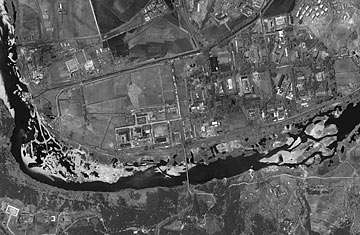
This satellite image, provided by DigitalGlobe, shows the nuclear complex at Yongbyon, North Korea, on May 26, 2009
It's not what we know about rogue states and their nuclear bombs that should scare us — it's what we don't know. North Korea's test of a nuclear device on Monday may not have come as a surprise to Washington, but only in the sense that Washington knew Pyongyang was defiant enough to set one off. Beyond that, truth be told, Washington is completely in the dark about North Korea's intentions. It can only expect the worse and hope for the better. (See pictures of North Korea's DMZ.)
Since its founding in 1948, North Korea has been an American intelligence nightmare. There's no American embassy in Pyongyang, few Americans visit the country, and, when they do, any substantive contact with North Koreans is impossible. We have no idea which generals are for the bomb and which are against. For that matter we're not even sure Kim Jong Il, North Korea's leader, is really in charge. (See TIME's photo-essay "Kim Jong Il: Doctored Photos?")
It is impossible for American intelligence to understand the North's military, the people who keep Kim in power. Military officers are rarely let out of the country, and when they are they travel in pairs, preventing any possibility of making contact. To give you an idea just how impenetrable the military is, North Korea is the only country in the world that can execute large deployments while maintaining radio silence. If it can enforce discipline like that on the military, it's not surprising that it has no problem keeping its nuclear secrets. (See TIME's photo-essay "North Korea Goes to the Polls.")
There are always lucky breaks, but we have to face that fact that we will never get inside North Korea to the point that we can rely on an international monitoring system. On Tuesday, the U.S. military flew "sniffer" planes off North Korea's coast, hoping to learn more about Monday's test. But it will be of little help. It cannot tell us how much plutonium the North still has, whether it intends to restart the Yongbyon reactor, or, for that matter, whether it is seriously thinking about invading South Korea.
We have the same problems with Iran, having no idea how close it is to a bomb. Since the Shah, the American intelligence community every four years incorrectly predicted Iran would get the bomb in the next five years. Today, even if Iran were to submit to complete international inspections of its civilian nuclear facilities, the suspicion would always hang over us that Iran has kept a secret nuclear-weapons program run by the military.
What this all means is that better intelligence, pre-emptive sanctions based on incomplete or inaccurate intelligence, and threats are not going to stop North Korea or Iran from becoming nuclear powers. Instead what we need is an ex post facto international regime with real teeth: You test a bomb, and you face certain and total economic embargo, one that will make the pre-emptive sanctions we have in place now seem like a day at the polo club. Right now China should be closing its border with North Korea, cutting off everything except food. It is only when the lights go off in Pyongyang that the North Koreans will seriously consider giving up the bomb.
Baer, a former CIA field officer assigned to the Middle East, is TIME.com's intelligence columnist and the author of See No Evil and, most recently, The Devil We Know.
